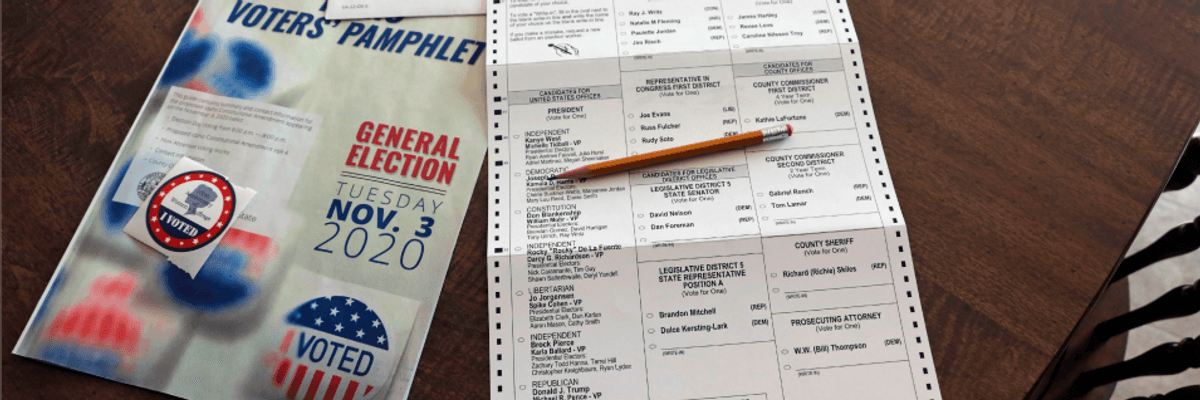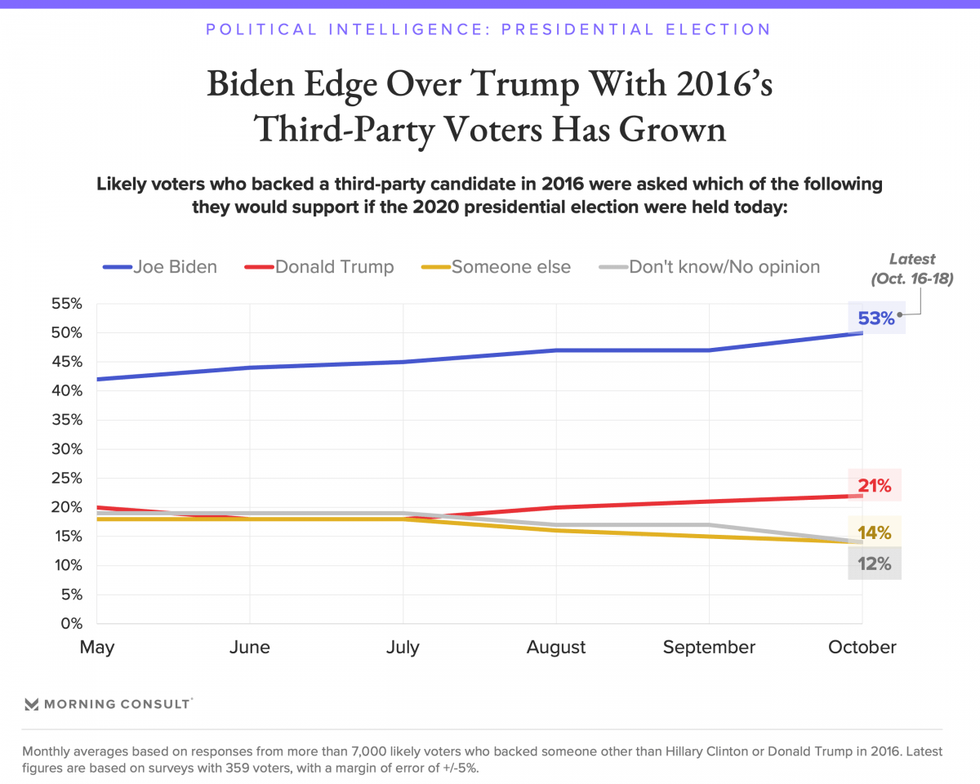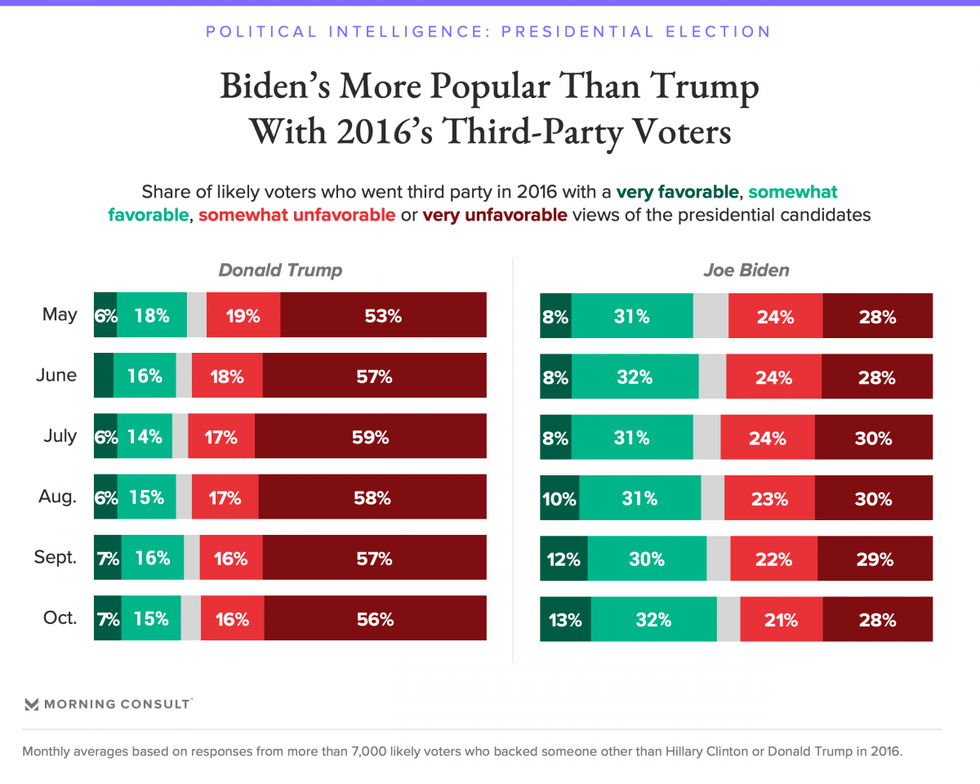

SUBSCRIBE TO OUR FREE NEWSLETTER
Daily news & progressive opinion—funded by the people, not the corporations—delivered straight to your inbox.
5
#000000
#FFFFFF
To donate by check, phone, or other method, see our More Ways to Give page.


Daily news & progressive opinion—funded by the people, not the corporations—delivered straight to your inbox.

A mail-in absentee ballot for the 2020 general election ready to be filled out. (Photo: Photographer Don and Melinda Crawford/Education Images/Universal Images Group via Getty Images)
Millions of Americans voted for third-party candidates in 2016, but a new poll released Thursday shows that a large majority of those who rejected the United States' two major political parties four years ago are not planning to do so in 2020, with Democratic presidential nominee Joe Biden holding a substantial advantage over Republican incumbent President Donald Trump among that voting bloc.
Between October 16-18, Morning Consult Political Intelligence surveyed 359 likely voters who opted for candidates other than Trump or Hillary Clinton in 2016 and found that 53% are supporting Biden in this year's election, while just 21% are backing Trump.
Another 14% said they will vote third-party again, and 12% remain undecided.

According to monthly averages of daily polling conducted by Morning Consult, Biden's popularity among likely voters who eschewed both major-party nominees four years ago has improved throughout the year.
From May to October, the percentage of those who voted third-party in 2016 but said they will back Biden this year increased from 42% to 50%, while Trump's standing among the group during the same time period stagnated at around 20%.
Of the Americans who hold unfavorable views of both of 2020's presidential nominees, 18% supported third-party candidates four years ago.
Yet Biden's favorability has improved among this group in the past six months, with the latest poll showing that 49% of likely voters who picked third-party candidates in 2016 view him positively, compared with 47% who view him negatively.
Over the same time period, Trump has remained overwhelmingly unpopular among this slice of the electorate, with roughly one-quarter expressing favorable views and three-quarters holding unfavorable views of the president.

In 2016, 6% of U.S. voters cast a ballot for a third-party candidate, and their combined share of the vote was larger than Trump's slim margins of victory in Arizona, Florida, Michigan, Pennsylvania, and Wisconsin.
Four years later, far fewer voters--just 2% nationwide--say they are interested in voting for someone other than Biden or Trump in this year's contest.

The voters who intend to vote third-party in 2020 tend to be politically unaffiliated and are disproportionately young, with 41% falling between the ages of 18 and 34.
More identify as liberal or moderate than conservative, the majority are white, nearly half earn less than $50,000 per year, and they are more likely to consider the economy and healthcare as top priorities.
Dear Common Dreams reader, The U.S. is on a fast track to authoritarianism like nothing I've ever seen. Meanwhile, corporate news outlets are utterly capitulating to Trump, twisting their coverage to avoid drawing his ire while lining up to stuff cash in his pockets. That's why I believe that Common Dreams is doing the best and most consequential reporting that we've ever done. Our small but mighty team is a progressive reporting powerhouse, covering the news every day that the corporate media never will. Our mission has always been simple: To inform. To inspire. And to ignite change for the common good. Now here's the key piece that I want all our readers to understand: None of this would be possible without your financial support. That's not just some fundraising cliche. It's the absolute and literal truth. We don't accept corporate advertising and never will. We don't have a paywall because we don't think people should be blocked from critical news based on their ability to pay. Everything we do is funded by the donations of readers like you. Will you donate now to help power the nonprofit, independent reporting of Common Dreams? Thank you for being a vital member of our community. Together, we can keep independent journalism alive when it’s needed most. - Craig Brown, Co-founder |
Millions of Americans voted for third-party candidates in 2016, but a new poll released Thursday shows that a large majority of those who rejected the United States' two major political parties four years ago are not planning to do so in 2020, with Democratic presidential nominee Joe Biden holding a substantial advantage over Republican incumbent President Donald Trump among that voting bloc.
Between October 16-18, Morning Consult Political Intelligence surveyed 359 likely voters who opted for candidates other than Trump or Hillary Clinton in 2016 and found that 53% are supporting Biden in this year's election, while just 21% are backing Trump.
Another 14% said they will vote third-party again, and 12% remain undecided.

According to monthly averages of daily polling conducted by Morning Consult, Biden's popularity among likely voters who eschewed both major-party nominees four years ago has improved throughout the year.
From May to October, the percentage of those who voted third-party in 2016 but said they will back Biden this year increased from 42% to 50%, while Trump's standing among the group during the same time period stagnated at around 20%.
Of the Americans who hold unfavorable views of both of 2020's presidential nominees, 18% supported third-party candidates four years ago.
Yet Biden's favorability has improved among this group in the past six months, with the latest poll showing that 49% of likely voters who picked third-party candidates in 2016 view him positively, compared with 47% who view him negatively.
Over the same time period, Trump has remained overwhelmingly unpopular among this slice of the electorate, with roughly one-quarter expressing favorable views and three-quarters holding unfavorable views of the president.

In 2016, 6% of U.S. voters cast a ballot for a third-party candidate, and their combined share of the vote was larger than Trump's slim margins of victory in Arizona, Florida, Michigan, Pennsylvania, and Wisconsin.
Four years later, far fewer voters--just 2% nationwide--say they are interested in voting for someone other than Biden or Trump in this year's contest.

The voters who intend to vote third-party in 2020 tend to be politically unaffiliated and are disproportionately young, with 41% falling between the ages of 18 and 34.
More identify as liberal or moderate than conservative, the majority are white, nearly half earn less than $50,000 per year, and they are more likely to consider the economy and healthcare as top priorities.
Millions of Americans voted for third-party candidates in 2016, but a new poll released Thursday shows that a large majority of those who rejected the United States' two major political parties four years ago are not planning to do so in 2020, with Democratic presidential nominee Joe Biden holding a substantial advantage over Republican incumbent President Donald Trump among that voting bloc.
Between October 16-18, Morning Consult Political Intelligence surveyed 359 likely voters who opted for candidates other than Trump or Hillary Clinton in 2016 and found that 53% are supporting Biden in this year's election, while just 21% are backing Trump.
Another 14% said they will vote third-party again, and 12% remain undecided.

According to monthly averages of daily polling conducted by Morning Consult, Biden's popularity among likely voters who eschewed both major-party nominees four years ago has improved throughout the year.
From May to October, the percentage of those who voted third-party in 2016 but said they will back Biden this year increased from 42% to 50%, while Trump's standing among the group during the same time period stagnated at around 20%.
Of the Americans who hold unfavorable views of both of 2020's presidential nominees, 18% supported third-party candidates four years ago.
Yet Biden's favorability has improved among this group in the past six months, with the latest poll showing that 49% of likely voters who picked third-party candidates in 2016 view him positively, compared with 47% who view him negatively.
Over the same time period, Trump has remained overwhelmingly unpopular among this slice of the electorate, with roughly one-quarter expressing favorable views and three-quarters holding unfavorable views of the president.

In 2016, 6% of U.S. voters cast a ballot for a third-party candidate, and their combined share of the vote was larger than Trump's slim margins of victory in Arizona, Florida, Michigan, Pennsylvania, and Wisconsin.
Four years later, far fewer voters--just 2% nationwide--say they are interested in voting for someone other than Biden or Trump in this year's contest.

The voters who intend to vote third-party in 2020 tend to be politically unaffiliated and are disproportionately young, with 41% falling between the ages of 18 and 34.
More identify as liberal or moderate than conservative, the majority are white, nearly half earn less than $50,000 per year, and they are more likely to consider the economy and healthcare as top priorities.